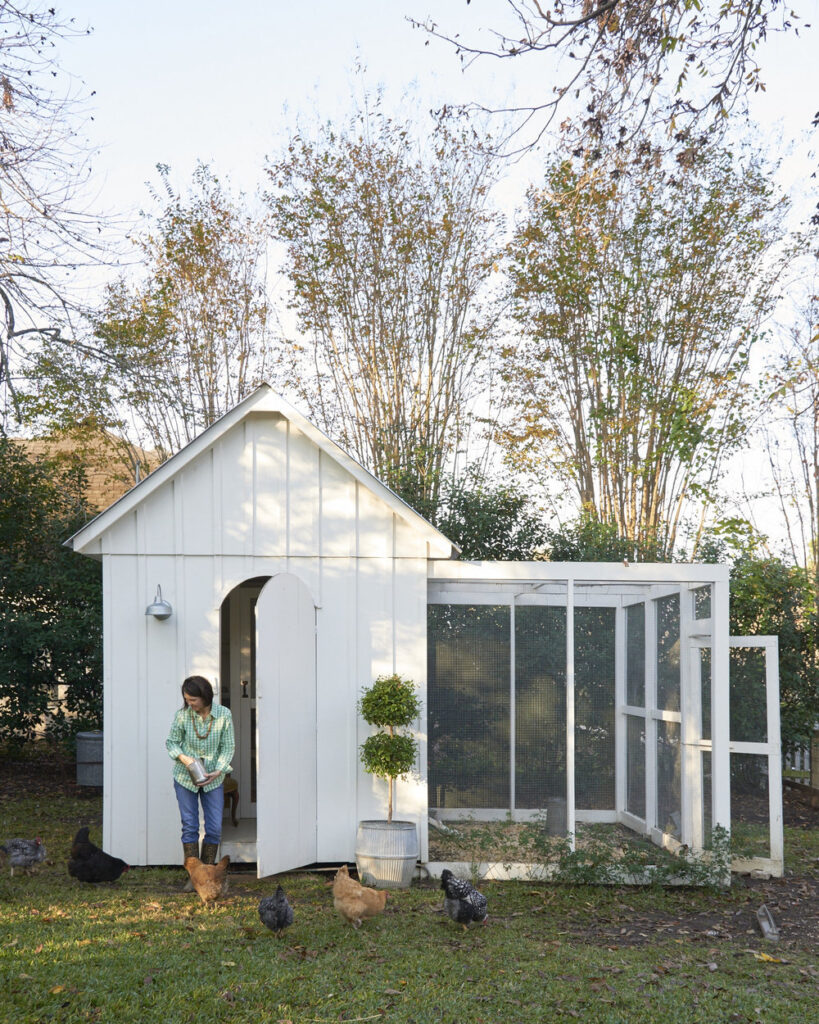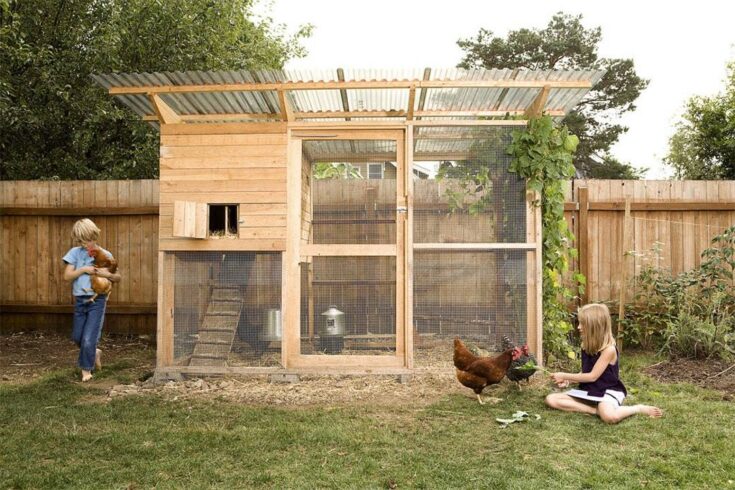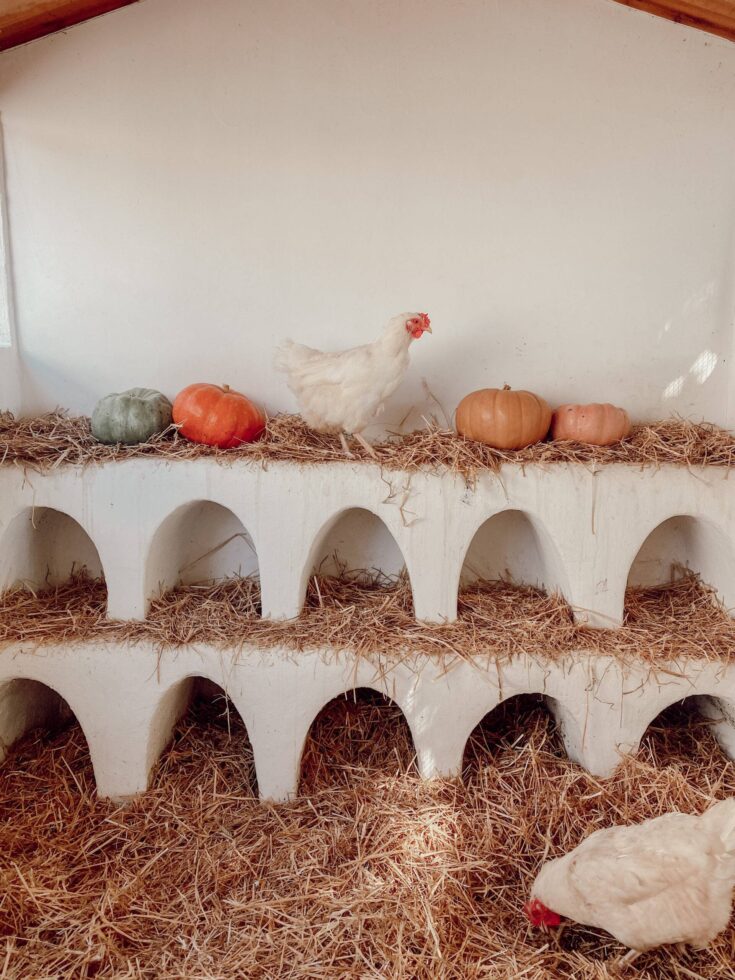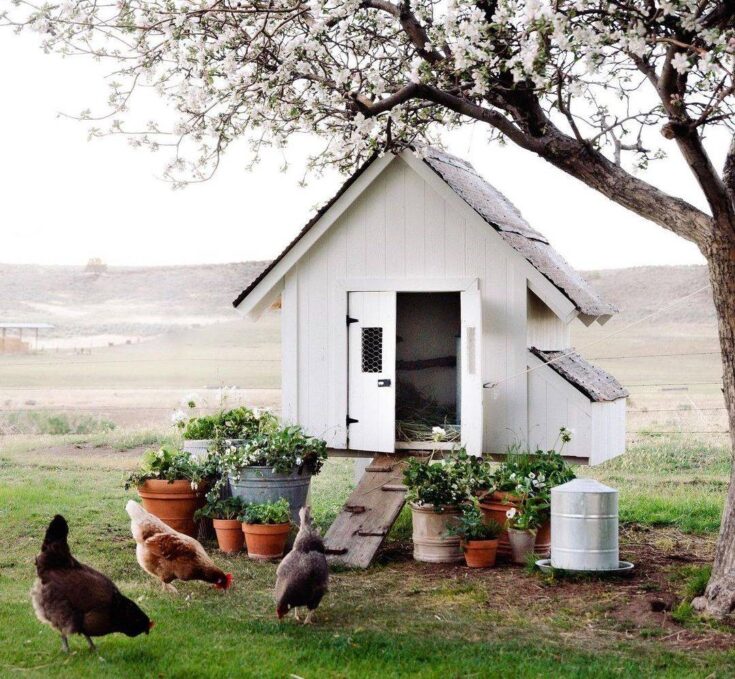Raising backyard chickens has become an increasingly popular trend among urban and suburban homeowners. Not only do these feathered friends provide fresh eggs, but they also bring a delightful charm to your garden.
Whether you’re a seasoned chicken keeper or a novice, one thing is certain: your chickens deserve a safe and comfortable space to roam and rest. In this article, we’ll explore creative ideas – with links to plans! — for chicken runs and coops that will inspire and enhance your backyard flock.
Table of contents
Benefits of Keeping Backyard Chickens
Keeping your own chickens can offer numerous benefits, ranging from practical advantages to personal and environmental perks. Here are some key benefits of raising backyard chickens:
- Fresh Eggs: One of the primary reasons people keep chickens is for the daily supply of fresh eggs. Homegrown eggs are known for their superior taste, vibrant yolks, and higher nutritional value. Plus, you have control over the hen’s diet and living conditions, ensuring healthy and organic eggs.
- Sustainable Food Source: Raising chickens allows you to have a sustainable and self-sufficient food source right in your backyard. You reduce your dependence on commercial egg producers and contribute to a more eco-friendly food system.
- Organic Pest Control: Chickens are excellent natural pest controllers. They love to forage and consume insects, slugs, and snails that can damage your garden. By allowing your chickens to roam in designated areas, they help keep pests in check without the need for harmful chemicals.
- Fertilizer Production: Chickens produce nutrient-rich manure, which is a valuable organic fertilizer. Properly composted chicken manure can be used to enrich your garden soil, promoting healthier plant growth and reducing the need for synthetic fertilizers.
- Educational Opportunities: Keeping chickens provides a unique and interactive learning experience, especially for children. They can observe the life cycle of chickens, learn about responsible animal care, and develop a deeper understanding of where their food comes from.
- Therapeutic and Stress-Relieving: Interacting with chickens and being around nature has been proven to have a calming effect on individuals. The simple act of feeding, observing, and caring for chickens can be therapeutic and help reduce stress levels.
- Waste Reduction: Chickens are excellent waste managers. They can consume many kitchen scraps, reducing household waste and promoting composting. By feeding your chickens food scraps, you contribute to minimizing landfill waste and adopting a more sustainable lifestyle.
- Entertainment and Companionship: Chickens have unique personalities and can be entertaining and delightful companions. Their quirky behaviors and social interactions can bring joy and amusement to your daily life.
Keeping chickens offers a wide range of benefits, from a sustainable food source and organic pest control to educational opportunities and personal well-being. It’s a rewarding and enriching experience that brings a touch of nature and self-sufficiency to your home.
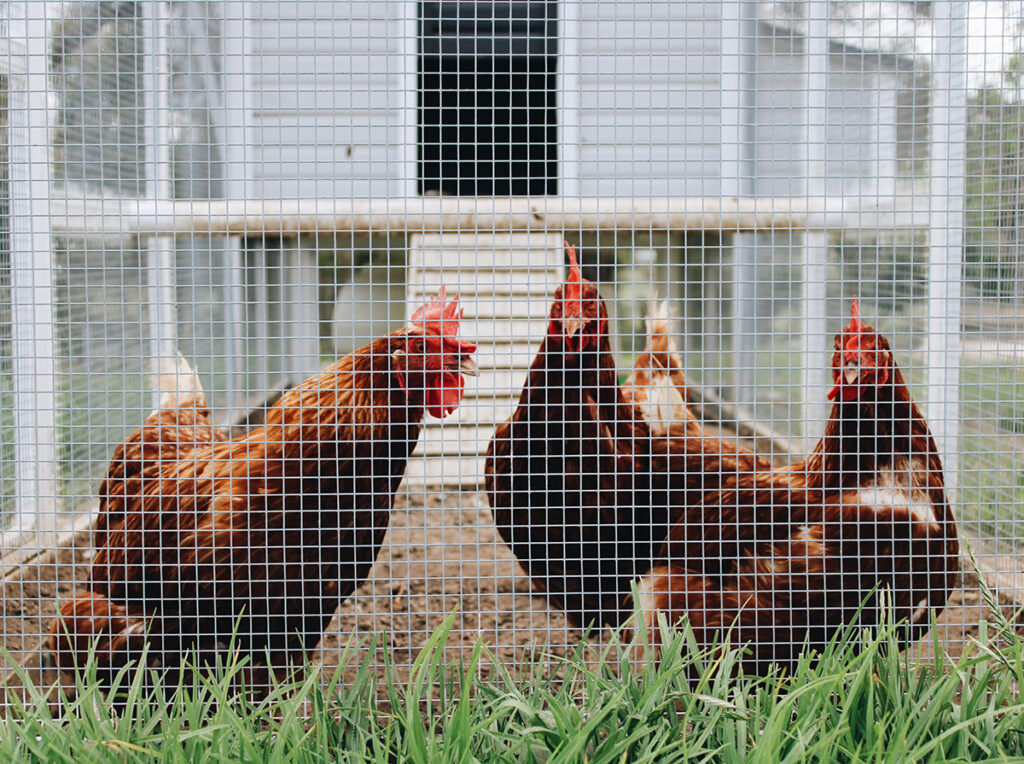
How to Care for Chickens
Taking care of chickens involves several essential aspects to ensure their health, well-being, and productivity. Here are some key considerations for chicken care:
- Housing: Provide a secure and comfortable coop for your chickens. The coop should protect them from predators, extreme weather conditions, and offer adequate space. Aim for at least 4 square feet per chicken inside the coop and 8-10 square feet per chicken in the outdoor run. Ensure good ventilation, nest boxes for laying eggs, and perches for roosting.
- Feeding: Offer a balanced and nutritious diet to meet your chickens’ nutritional needs. A commercial layer feed is suitable for adult laying hens, while starter feed is for chicks. Supplement their diet with fresh fruits, vegetables, and occasional treats like mealworms. Provide clean water at all times and ensure it is easily accessible.
- Grit and Calcium: Chickens need grit to aid in digestion. Offer insoluble grit, such as crushed oyster shells or granite, which helps them grind their food in their gizzards. Calcium is vital for eggshell formation. Provide a separate container of crushed oyster shells or offer a calcium supplement in their feed.
- Health Care: Regularly monitor your chickens’ health and watch for any signs of illness. Provide vaccinations as recommended by a veterinarian, especially for common diseases like Marek’s disease and Newcastle disease. Keep the coop clean and dry to prevent bacterial or parasitic infestations. Quarantine new chickens before introducing them to the existing flock to prevent the spread of diseases.
- Egg Collection: Collect eggs daily to prevent them from getting dirty or broken. Inspect the eggs for any abnormalities or signs of illness. Discard any cracked or soiled eggs and clean the nest boxes regularly to maintain a hygienic environment.
- Cleaning and Maintenance: Regularly clean the coop to maintain good sanitation. Remove soiled bedding, droppings, and uneaten food. Replace bedding material, such as straw or wood shavings, to keep the coop dry and odor-free. Conduct routine checks for wear and tear in the coop, making any necessary repairs promptly.
- Predator Protection: Secure the coop and run to protect your chickens from predators such as raccoons, foxes, and rats. Use sturdy fencing with buried wire mesh to prevent digging, and cover the coop windows with predator-resistant hardware cloth. Close the coop securely at night to keep chickens safe from nocturnal predators.
- Social Interaction and Enrichment: Chickens are social animals and benefit from social interaction. Spend time with your flock, observe their behavior, and provide opportunities for them to forage, scratch, and dust bathe. Offer perches, dust bathing areas, and some toys or objects for pecking and entertainment.
- Seasonal Considerations: Adjust care according to the seasons. Provide shade and fresh water during hot weather, and consider providing a shallow pool or misting system to help chickens cool down. In colder months, insulate the coop and provide supplemental heat if necessary, ensuring good ventilation to prevent moisture buildup.
- Regular Monitoring: Observe your chickens daily for any signs of distress, injury, or abnormal behavior. Look for changes in appetite, egg production, or droppings. Early detection of health issues allows for timely intervention.
Remember, each breed and individual chicken may have specific needs and characteristics, so it’s essential to research and adapt your care accordingly. Building a relationship with your flock and being attentive to their needs will contribute to their overall well-being and productivity.
Backyard Chicken Coop and Chicken Run Ideas
Here’s a collection of our favorite backyard chicken coop plans and inspiration to get your project off to a great start!
Our Favorite DIY Chicken Coop Plans
It's a farmhouse for your chickens! These DIY coop building plans have dedicated storage area, generously sized windows that flood the interior with natural light, and an ample chicken run for your flock to roam. This chicken coop and run can comfortably accommodate 12-16 chickens. Bock-bock!
This simple A-frame chicken coop plan is easy to make and provides enough space for 3-5 chickens.
These Plymouth Chicken coop plans include detailed instructions for a walk in chicken coop with attached run. The coop has been designed with ventilation, nesting areas, and predator prevention in mind. This coop is a good size for around 12-20 chickens.
The Garden Coop walk-in chicken coop plans give you the foundation — and the freedom — to build the perfect chicken coop for your backyard flock. Whether you're new to chickens or to building, these plans get you closer to raising your own farm-fresh eggs, without turning your backyard into a barnyard.
Discover the perfect combination of modern design and functionality with these modern chicken coop plans. These meticulously crafted plans provide detailed instructions and diagrams to help you build a stylish and practical chicken coop that will be the envy of your flock.
The European Farmhouse Style Chicken Coop! So cool you'll be jealous it isn't for you! These coop plans come with a material list, tips/instructions, and professionally designed building plans!
In this post from Woodshop Mike, you'll find a step-by-step guide on creating your own chicken coop from scratch. From selecting materials to building techniques, this comprehensive tutorial provides the knowledge and inspiration you need to embark on your DIY chicken coop project.
This is my favorite of all the coops and the perfect plans for your urban homestead. These plans from The Brown Shed are pretty and functional, while making clean up simple and easy. The coop accommodates up to twelve chickens.
Chicken Coop Inspiration
This was an idea from Lauren Liess.com that we just loved. It isn't for chickens, but the style and look could easily be applied to a coop.
Progress with our DIY shed /chicken coop build + my new favorite deep muted green paint color
If you looking for some color and design inspiration for you coop, check out this post from Almafied. Her stylish backyard coop is full of functional ideas.
Over at The Roosting Place they have created a warm and comfortable home for their chickens. From discussing the coop's design and features to highlighting the importance of proper ventilation and predator-proofing, this post offers inspiration and practical tips for building a cozy chicken coop.
On Peaches to Pearls, the author takes us on a virtual tour of their beautiful and functional chicken coop. From showcasing the coop's charming design and thoughtful features to sharing insights on chicken care and maintenance, this post provides inspiration for creating a stylish and efficient home for your feathered friends.
Cathy and Garret share how to build a homemade chicken coop from start to finish, using salvage or reclaimed materials.
This cute little coop from Boxwood Ave is country living at its best! Chloe Mackintosh's traditional, white, cottage-style chicken coop has space for eight contented hens.
Carolyn's coop harmonizes perfectly with the style of her shed, providing a luxurious abode for her beloved Buff Orpington hens that would be the envy of any other poultry.
Meghan Tucker provides an in-depth review of the Garden Loft Chicken Coop. Everything you need to know before you start building your own coop.
This backyard build is unique and multifunctional space that serves as a greenhouse, chicken coop, and party room. A+ for inspiration!

Looking for more backyard ideas?
- 10 Unbelievable Outdoor Kitchens
- Use Irish Spring to Keep Out Garden Pests
- How to Attract Hummingbirds to Your Yard
- How To Make a DIY Modern Birdhouse
- The Ultimate Guide to Wood Fired Hot Tubs
- 5 DIY Composting Techniques for Creating Rich, Organic Fertilizer
- 10+ She Shed Ideas to Create Your Perfect Backyard Escape
